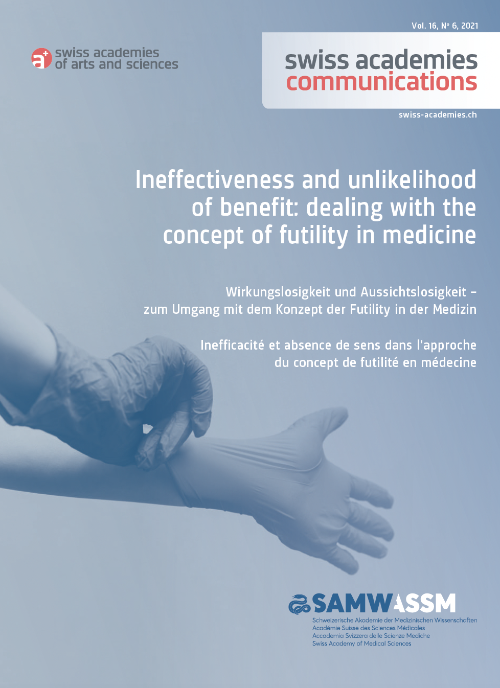The counselling and support of patients and their relatives in situations where medical treatment may be ineffective is an inherent task of medicine. Often this topic is described by the generic concept of medical futility.
It is up to healthcare professionals to evaluate, on the basis of scientific data and experience, whether a therapy is indicated or, on the contrary, whether it appears ineffective and/or offers little or no likelihood of benefit. This process, which involves a case-by-case assessment, is never free from subjectivity, since it is influenced by the value judgments of patients, their relatives, and healthcare professionals. Involved professionals bear a special professional and ethical responsibility.
Several medical-ethical guidelines of the SAMS deal with situations of ineffectiveness or unlikelihood of benefit. In view of the discussions on this topic, which intensified during the Covid-19 pandemic, the Central Ethics Committee (CEC) of the SAMS decided to address this topic in-depth and to set up a subcommittee. The results of this work were published in trilingual recommendations entitled «Ineffectiveness and unlikelihood of benefit: dealing with the concept of futility in medicine» (2021).
In addition to the theoretical background, which critically examines the concept of futility, the recommendations illustrate concrete examples. The SAMS thus offers practical advice in the hope that this approach will lead to a fundamental reflection on how to deal with ineffectiveness and unlikelihood of benefit in medicine. The SAMS invites professional associations, healthcare organizations, and patient associations to engage in a debate on this complex topic.
The main points are summarized in an article published in the Swiss Medical Bulletin (available in French or German).
Eight recommendations with examples
If it is clear that a treatment is ineffective, there is no medical indication. However, healthcare professionals may feel compelled to carry out certain treatments, even though they consider that they do not serve the patient’s best interests. For example because of expectations or pressure from the patient or their relatives. A total of eight recommendations – one of which is listed below as an example – offer guidance in such situations.
Recommendation «Defining the goal of treatment»: the overarching goal of treatment must be jointly defined with the patient or their representatives. In this context, healthcare professionals should take into account the consideration and knowledge of the patients, listen to their needs, wishes and fears, and enquire about the patient’s preferences. Professionals are to be guided by the treatment goal and to assess whether the procedure corresponds to this goal. The outcome must be properly documented.
Example: A patient with cervical cancer develops obstructive kidney failure, which, if left untreated, can be rapidly fatal. The patient would like to live to see the birth of her grandchild in two months’ time. Dialysis can extend life without, however, affecting the underlying malignancy. As it makes it possible for the patient to live to see her grandchild born, it may be appropriate.
